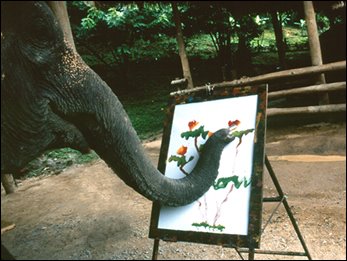I agree with this article on many points, but disagree on just as many. I agree that to make assumptions about a person's genealogy based on the shade of their skin is as unfair as it is uninformed. I find many points of contention, however, with the authors focus on words, a reliance that strikes me as ironic. The words "white, black, yellow, brown, etc." are merely what people use to convey certain concepts or images. To the best of my knowledge, language as we know it developed to enable our distant ancestors (who, incidentally, were African) to convey the thoughts their minds produced to the other members of their hunting/gathering group, facilitating teamwork. They might have decided to refer to rocks as rocks, but that does not imply any level of knowledge beyond that rocks are heavy round things that can be found on the ground. The word is merely a conduit to transport a thought, not a description of the object's every characteristic.
The profound irony of of racial tension (as I see it) is that the more sensitive people become towards the entire issue, the more difficult it becomes to overlook. The only reason a particular word or phrase becomes offensive is because of the way society views it, not because of any inherent trait of the word. I recognize that this issue is a very delicate one for many people, and that in all probability I know next to nothing about the realities of racial discrimination or labeling, but is it not apparent, at least, that the more delicate an issue becomes, the easier it is to cross the line?
If you are describing a person, (or even something as mundane as a fence or building) you will likely choose the words that convey the most information about the subject with the least amount of effort or time. Another example that may help to illustrate my disagreement is paint. Let us choose green. The color green is not a primary color, meaning that in order to make it one must combine both yellow and blue. Despite this, you do not call green paint yellow-blue, for there is no such color. Yellow-blue is green, and varying the ratio of yellow to blue results in different shades of green (yellow-green and blue-green to name but a few). It may be true that a far more accurate word could be found to replace green, but, having said that, why would it be necessary?
I personally have no compunctions against someone labeling me as "white", and I certianly don't expect them to call me a Caucasian or a European (I have never been to Europe, so why would my ancestry automatically make me European? I believe there is a fine line between race and culture), but recognize that this could be do to the not-so-subtle predominance of white males in both history and modern society. It is far easier to denounce something when you have no actual experience with the issue at hand (racism, or more specifically racial terminology).
The bottom line, then, is that I see the article as promoting one set of broad connotations in favor of an even broader set, with the only real difference being how these connotations are applied. Is it truly favorable to designate people by their ancestry (labels that will, in time, develop their own negative implications), which they most likely have very little actual association with?

No comments:
Post a Comment